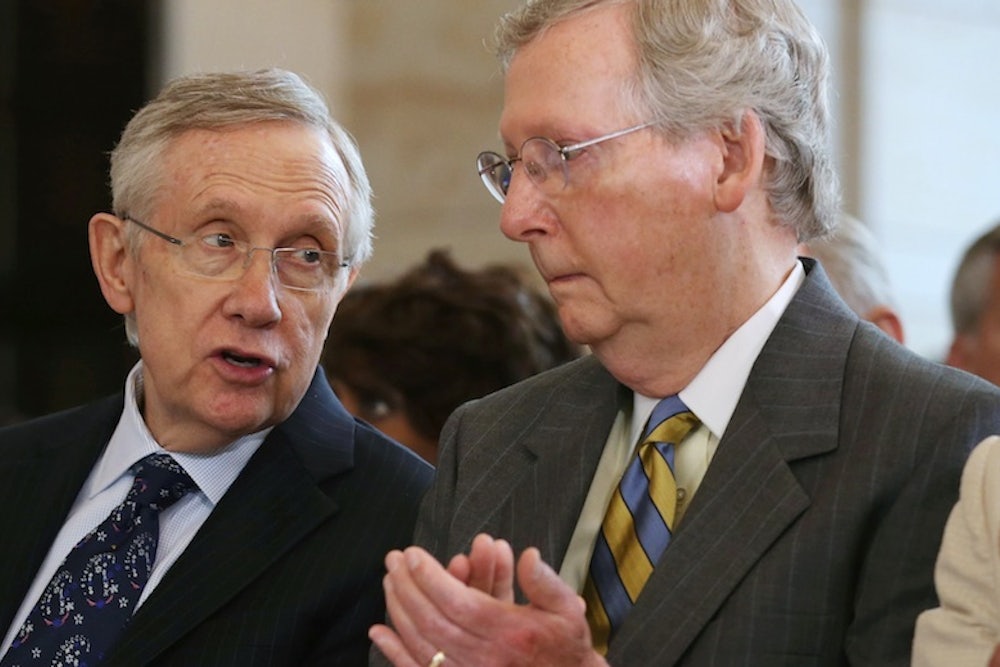Senate leaders are near an agreement that would re-open the government and increase the debt ceiling. According to multiple media reports—and since confirmed by TNR sources—the funding would last through January 15, the debt ceiling through February 7.
The first date is important because it is the date that automatic budget cuts from budget sequestration take place. Both parties have their issues with sequestration—Democrats don't like the cuts to domestic programs, Republicans don't like the cuts to defense. In order to discuss those and other fiscal matters, the two parties would also set up some kind of "bicameral" committee. The committee would make its recommendations by December 13.
Nothing is final, making it difficult to evaluate the terms. I'm still trying to sort out the significance of the timing. But Ezra Klein, who first reported the terms this afternoon, described it as a swap: Instead of negotiating about Obamacare, which is what House Republicans originally wanted, Democrats would be agreeing to negotiate about the budget and sequestration, items they were always ready to discuss. That sounds about right.
Obamacare may not escape the agreement completely unscathed. As of late afternoon, at least, the deal included two provisions. One would create new procedures for guaranteeing that people buying insurance through the new marketplaces are not getting extra, unwarranted financial assistance. The other provision would delay, by one year, what's known as a "reinsurance tax." The income verification provision sounds like more of a sure thing: Two Democratic sources told me the resinsurance tax might not make it into the final deal. Delay or reduction in the device tax—another idea that got attention in the last week—also appears to be off the table, at least for the moment.
Would the changes now under consideration represent major, fundamental changes to Obamacare? It wouldn't appear so. Republicans, convinced of the potential for fraud in Obamacare, have called for verification procedures that might have truly hobbled the new exchanges (the majority of which, as you might have heard, aren't running that smoothly now). But the provision in the Senate deal sounds more innocuous: It would call for the Secretary of Health and Human Services to certify that adequate verification processes were already in place, or something like that, with the Inspector General providing some kind of subsequent audit. The law should satisfy that criteria already, for reasons Judith Solomon of the Center on Budget and Policy Priorities explained over the summer.
The situation with the reinsurance tax is a bit more complicated. The tax applies to the operators of insurance plans—including employers who finance their own benefits, unions that run their own plans, and insurers who sell policies to smaller companies or indivdiuals. The fee is $63 per policy and, over the three years it is in place, would generate $25 billion of revenue. A portion of that, $5 billion, simply helps offset the cost of the Affordable Care Act's coverage expansion. But the other $20 billion will create a special fund, designed to reimburse those insurers that end up attracting an unusually high number of people with serious, expensive-to-treat medical conditions. The timing here is important: It coincides with the imposition of new regulations, prohibiting insurers from charging higher rates or denying coverage to people with pre-existing conditions. The tax is meant to help mitigate the initial impact.
As TNR's Alec MacGillis noted earlier today, changes to the reinsurance tax—like changes to the device tax—would be a reminder of the power lobbyists have wielded in this debate. The employers and unions who must pay the tax have complained about it, saying the extra cost will force them to reduce benefits or pass along higher premiums. Meanwhile, Democrats on Capitiol Hill have been eager to help the unions, which help support their campaigns and are worried that Obamacare's regulatory changes could weaken the "Taft-Hartley plans" some of them run.
In theory, altering the reinsurance tax could also deprive insurers of the money they were expecting to offset the cost of beneficiaries in worse health. If that were to happen, insurers might react by raising rates next year. But—again, based on what sources are saying—the plan here is to push collection of the tax back by one year, but to start paying out the money at the outset and leave the duration at three years. (In other words, the tax would pay out in years one through three, but be collected in two through four.) If so, the ultimate impact on government finances and on insurers might be negligible.
That's a lot of "ifs" and "coulds"—again, the terms are all pretty fuzzy and, apparently, still in flux. But that's the nature of these deals. We'll know more soon enough. And, of course, the bargain could change before passing the Senate and then the House—if, indeed, it can pass those chambers at all.
Stay tuned.
